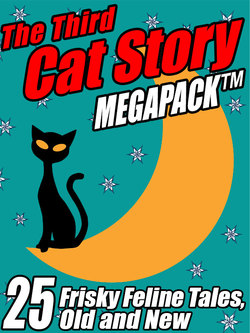Читать книгу The Third Cat Story Megapack - Damien Broderick - Страница 11
На сайте Литреса книга снята с продажи.
ОглавлениеA LIMP DEAD CAT IN MY ARMS, by Michael Hemmingson [Poem]
Worf died in my arms.
That’s the name of my cat. Worf.
Yes, Star Trek: Next Generation.
Whenever the TV was on and someone
yelled, “Mr. Worf!” my cat, Worf,
would jump up, wondering who was calling him.
The problem was renal failure—drinking a lot of water
and peeing up a storm like a drunk on
a Friday night with too much extra
money for too much beer.
Then: he couldn’t stand, walk, or eat,
his legs and lower body shaking
as if he had Lou Gehrig’s Disease,
as he tried to move from the floor
to the litter box, giving up
and taking a painful shit
as he lay crying, cursing the fate of old age.
I thought about taking one of
my two-year-old daughter’s diapers
and putting it on him, reminding
me how my father had to wear adult
diapers in his last hours
in late Spring, 2011, finding out
the truth when I returned from
Mexico to see my child.
It happened again, Mexico and death.
I came home from a trip to Tijuana
and he was half dead, my cat,
like my father was two years prior;
my other cat, Poe,
did not understand
what was happening to her brother.
I didn’t think Worf would make it
through the night, in bed with me.
Death slept between us.
Twelve years ago, when he was eight weeks,
he was rambunctious and liked to bite
everyone, everything,
bouncing and leaping from
one end of a room to another.
In the morning I got him ready for
the Humane Society, a quick and peaceful end
of a good twelve-year run. I wrapped him in
a blanket and he was excited about
going outside; he went limp in my arms,
mouth open and eyes staring glassy at nothing,
the way my father looked when he killed himself with a gun
and I saw his face when the
Medical Examiner team carted him out of the
garage on a gurney, a hole in his temple
where he had put a .22 bullet like
a nail into a slab of wood.
I sat down on a green lawn chair
in front of my studio apartment
on the beach,
the grass not so green beneath my feet, yellow and
dying like all living things die.
The mail carrier came by to drop off a batch
of books and said, “Oh, your cat likes to lounge in the sun.”
I said, “Actually, he just died thirty seconds ago.”
The carrier peered closely at Worf and saw this was true,
muttered, “I’m sorry,” and quickly walked away.
Death is too much for the US Postal Service.
He must have had a heart attack, Worf.
I wasn’t sure if he was quite dead: he was warm
and I was certain I could detect a faint heartbeat
like the final clicks of ticker tape at the end
of a bad day on Wall Street.
The intake person at the Humane Society
said they would check for vital signs to make
sure, then administer the drug, the Big Sleep, and
prepare him for cremation. “We cremate twice a week
and once a month a group takes the ashes
out to the sea,” I was told.
I did not want to think of
Worf in some freezer with a pile of dead cats
waiting to be fried into dust and chips of feline remains
like the dead were piled up and burned
after the bombing of Dresden in February, 1945.1
I was asked if I wanted the blanket back.
No, no I did not want the blanket he died in.
I paid the $10 handling fee.
As a cute, black-haired kitten, he cost me $125
at the pet store twelve years ago.
His death cost me ten bucks and a blanket.
1. See Kurt Vonnegut, Slaughterhouse-Five, 1969.
